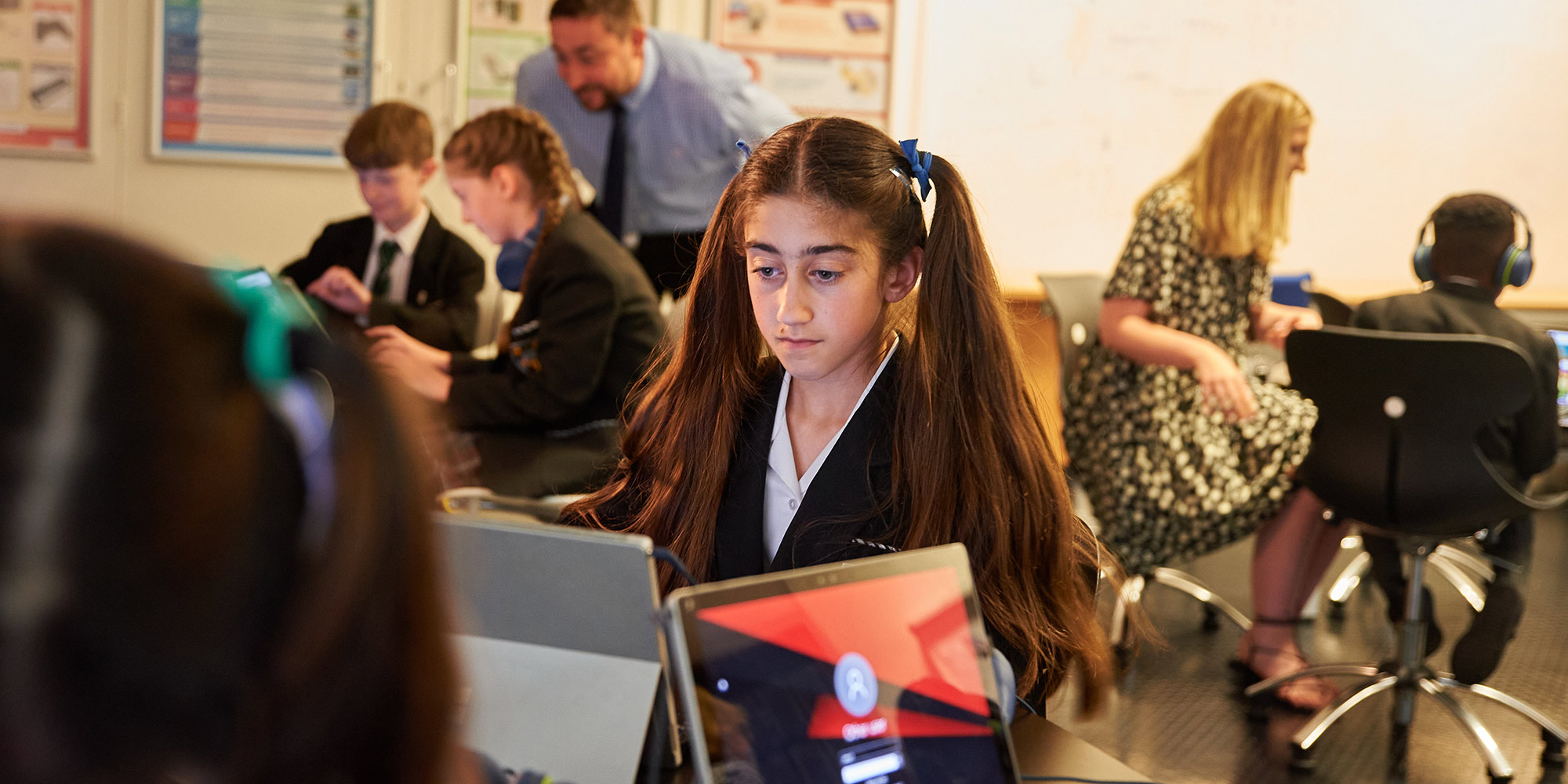Mathematics
The aim of the Mathematics Department is to foster an environment where every student succeeds and has the confidence and self-belief to solve problems, gain understanding and enjoy exploring the elegant enigmas of number.
This department believes that everyone ‘can do’ maths and that it is a facilitating subject for a host of degree and career choices.
Mathematics is, in its way, the poetry of logical ideas. Albert Einstein
We run Maths Clubs for support or further challenge. This club is well attended and supported by our Sixth Form Subject Mentors.
Mathematics: Prep
Course Description
We follow the National Curriculum for Mathematics (Primary school)
Aiming for Maths Mastery.
The Prep school Maths curriculum/course exemplifies the progression in mental and written calculations, through a concrete, pictorial and abstract approach, for addition, subtraction, multiplication and division with the key aim for pupils being that through a consistent and progressive approach to teaching and learning calculations they will be secure in their understanding of place value and be able to select the most efficient method of calculation for any given mathematical problem.
Curriculum Overview
Mathematics is a core subject in the National Curriculum, and our scheme of work is based on the New National Curriculum (September 2014) which forms the basis for implementing the statutory requirements of the programme of study for mathematics. In addition, staff follow the White Rose Schemes of Work in Upper Prep and Primary Stars in Lower Prep which give long term overviews, termly break downs of themes, as well as ‘small steps’ which show how each learning objective is broken down into smaller more manageable steps.
The curriculum at the Prep school focuses on developing subject knowledge alongside the development of core skills using the PSB framework. The Prep School Baccalaureate (PSB) is a framework of study for children in junior and preparatory schools which focuses on the active development and assessment of 6 core skills: Communication, Collaboration, Leadership, Independence, Reviewing and improving and Thinking and Learning.
What are the unique selling points of studying this subject at St Columba’s College?
Maths Challenge and competitions (see section 12)
Maths Week (see section 12)
Ability sets to ensure each child reaches their potential
How are the students assessed?
A baseline assessment is set at the start of each year using INCAS These tests are sat online and provide age related indicators as well as indicating strengths and weaknesses in arithmetic and mental maths skills. The data collected from these tests is used to track a child’s progress for the duration of their time in the Prep School.
Pupils are assessed at the end of each unit of work using a short written test. In addition, pupils sit a mid year arithmetic assessment half way through the Lent term and end of year arithmetic and reasoning and problem solving assessments in June.
Home Learning
Children in both Upper and Lower Prep are set home learning tasks twice a week and tasks are due in the following day. These tasks can take a variety of forms: online Maths games to practise times tables, number bonds, etc., written tasks, e.g. calculations, reasoning and problem solving questions, board games to play with an adult/sibling, research/enquiry based activities e.g. shape/angle hunt, design a poster/information sheet on a given concept, and many more.
How can parents/guardians support their child’s learning?
We encourage parents and guardians to show an interest in their child’s learning in all areas. In Maths, we believe developing number confidence and a positive attitude to maths has a crucial impact on a child’s learning, and their ability to use numbers in everyday life as they grow. Three top tips we would give to parents/guardians are:
- Be positive about maths. Try not to say things like “I can’t do maths” or “I hated maths at school” – your child may start to think like that themselves.
- Point out the maths in everyday life. Include your child in activities involving numbers and measuring, such as shopping, cooking and travelling.
- Praise your child for effort rather than for being “clever”. This shows them that by working hard, they can always improve.
Useful Links
www.mathszone.co.uk lots of games and activities for all year groups and all maths topics
Woodlands Resources Maths Zone – Free Maths Games (primaryhomeworkhelp.co.uk) lots of interactive maths games
www.mymaths.co.uk
Daily 10 – Mental Maths Challenge – Topmarks a popular game for developing fluency with number bonds, times tables and arithmetic skills. Learn to Count with fun Counting Games for KS1 Children (topmarks.co.uk) also has a host of other maths games including Hit the Button Hit the Button – Quick fire maths practise for 6-11 year olds (topmarks.co.uk)
Math is Fun (mathsisfun.com) this website is useful for subject knowledge and has end of theme quizzes to test conceptual and procedural understanding.
Maths Challenges and Competitions
Children enjoy competing in regional and national Maths Challenges, including The Primary Maths Challenge (Prep 5 and 6), The First Maths Challenge (Prep 3 and 4), The UKMT Junior Maths Challenge (Prep 5 and 6), Quiz Club Championships and local Maths challenges hosted by Douglas Buchanan in various local schools.
Maths Week
The whole Prep school enjoy a week of Maths in November to coincide with Maths Week England. Children experience maths workshops, daily Maths puzzles and challenges, competitions and alternative maths activities. This year the College head of Maths delivered an exciting Maths Origami workshop and A Level student supported Prep school pupils with a range of activities, including judging the creative ‘Maths and Art’ competition.


